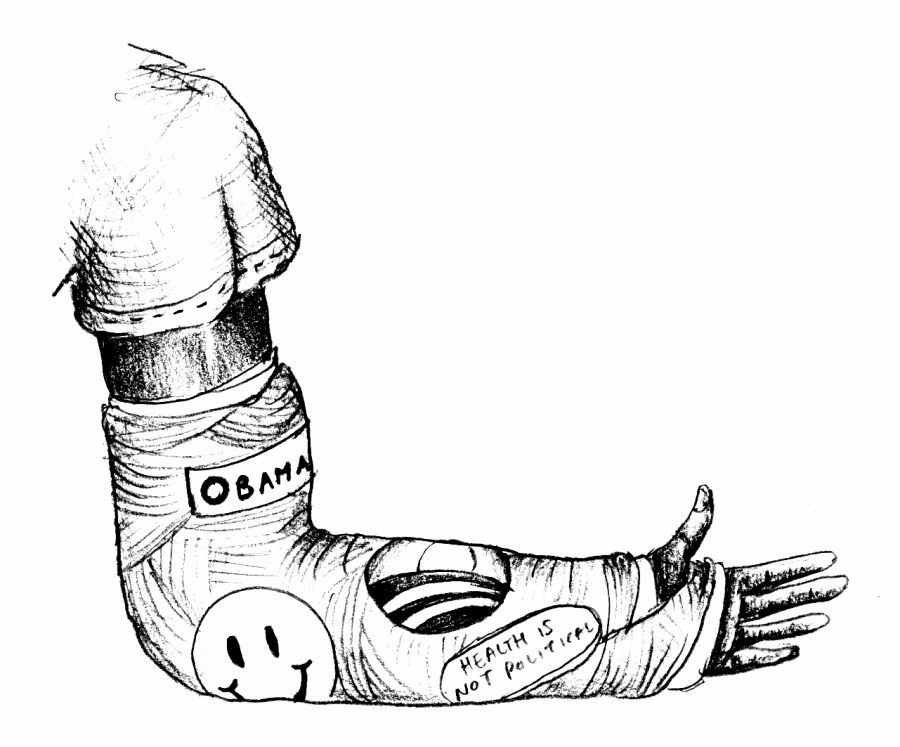The Affordable Care Act: a moral obligation
January 26, 2017
With the new Trump administration settling in, there has been a lot of talk about what is first on the agenda.
The consensus seems to be that the plan is, first and foremost, to repeal and replace the Affordable Care Act (I refuse to call it Obamacare, as it was a nickname given to it by its opponents in order to disparage it and doesn’t give a chance for people to view it in a fair light).
President Trump has clashed with Republicans
on plenty of issues during his campaign, but this is one goal that he and the Republican-controlled Congress are likely to accomplish without much discord.
It is difficult for me to be non-partisan on this issue, and it is not because of my political stances. I am a registered independent, and I am not known for holding far-left stances on most issues.
As someone who is not rich and who has had some troubled circumstances that the Affordable Care Act has helped to ease, I take this issue personally. As someone who would not have health insurance without the Affordable Care Act, I have a duty to advocate for its exigency.
Without it, I would have had to resort to receiving care under my parents’ plan, but my father died of a terminal illness when I was 15. He didn’t have health insurance of his own and I was kicked out of my mother’s house the next year.
Fortunately I do not have a terminal illness, but if I did and former President Obama never worked to get this law passed, it’s not likely that I would have received care and, as a result, even less likely that I would have survived the ailment.
This is what the opponents of the Affordable Care Act seem to overlook: it achieved universal health care.
Under the previous model, you either needed to be covered under someone else’s health care if they had a plan that allowed for it, or you needed health care benefits from your job. But the latter wasn’t always the case with people who worked at lower-level jobs and didn’t live with their parents.
In other words, if your life didn’t go perfectly and your circumstances didn’t follow the expected familial and occupational norm, it was more difficult or downright impossible for you to have insurance.
Obama, for all his faults, wanted to do everything he could to get rid of this problem and was opposed by the other side on all fronts.
To his credit, he was successful. As stated, I personally benefited from this, and there are also documented cases of people who were less fortunate than I and did, in fact, have illnesses that were treated or cured with the Affordable Care Act.
One of these cases was testified to Speaker Paul Ryan recently at a CNN open hall, to which Ryan gave an answer that I found unsatisfactory.
As he picked apart what was wrong with the Affordable Care Act and didn’t emphasize what it had accomplished, he also failed to outline exactly what the replacement for the law would be if it were to be repealed. I find this irresponsible.
If Trump and the Republican Congress want to repeal the Affordable Care Act, they have a moral responsibility to lay out every detail about what the replacement would be.
This is the only responsible thing to do if they must oppose what is perhaps Obama’s most important accomplishment on principle.
The fact that the only answer we seem to be able to get out of Trump is that it is going to be replaced with something “tremebdzous” his most recent press conference says to me that they are not ready with a plan to replace it the same day that they repeal the ACA. This means that there is a possibility that they will repeal the ACA and take months or possibly years to come up with its replacement, and during this time there will be a significant number of Americans who will not have health care. To do this so abruptly would be opportunistic and, frankly, despicable.
I understand that there will be some who respond to my above point by saying that I don’t give Trump or Congress enough credit, to which I say: the Republican members of Congress have ranted incessantly about repealing this law since before it was passed.
That being said, if those in power do not have the moral sensibility to have a replacement for the ACA that is better than the law they are trying to repeal, they should either wait until they do have a replacement to repeal the ACA or they should not repeal and replace it at all.
Rather, they should improve on the ACA by finding solutions to its problems, such as the rising premiums (which could be solved by getting more people on the plan).
This is not something that American leadership can mess up on, as there are life-or-death consequences they are dealing with in the immediate future, and there is no room for Trump’s self-aggrandizement and attention grabbing at the expense of middle class and poor people’s health.









![Can’t buy me [self] love](https://vtcynic.com/wp-content/uploads/2024/04/self-care-FINAL-600x398.jpg)







